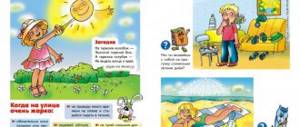Consultation for parents “On the threshold of school” consultation (preparatory group) on the topic
Arbuzova O.V. Consultation for parents “On the threshold of school.”
Dear moms and dads!
Soon you will become the parents of a first-grader, and the main thing for you now is to clearly understand what you expect from your child when he becomes a schoolchild. Parents' expectations can be very varied. At the same time, adults must understand that it depends on them whether the first of September will become a holiday from which a fascinating journey to knowledge begins, or the first day of an eleven-year sentence in an institution called “school.” Will you be able to choose the right school, program, teacher, buy a backpack and equip the future student’s workplace? And most importantly: can you create psychologically comfortable conditions for the child, under which adaptation to school will be easy and painless?
We have several months before the first of September and several months after - this is the time when we can and should give our future school life a good start. Then your first grader will definitely be successful, healthy and calm, he will have good relationships with the teacher and the children, and his home life will flow in love and harmony with his neighbors.
Today our “parent meeting” will be aimed at finding answers to controversial questions that, I hope, will help you better understand yourself and your future first-grader.
Let's look at the first question: “Is it time for the child to go to school or not?”
The following situation often arises: parents look at their developed, smart six-year-old child and really want him not to “fool around”, but to start studying at school, like you. Dear parents, do you think: is it bad to relieve intellectual underload?
Neurophysiologists believe that a child is ready for school at the average age of 7 years, because it is at the age of 7 that voluntary attention and many other brain mechanisms are formed that allow the child to be successful in learning. The brain of a seven-year-old is ready to simply sit through 45 minutes of a lesson. But if you send your child to school later, it will only be better. According to the observations of psychologists and teachers, children who go to school at 7.5 years old adapt better and often occupy a leading position among their peers. This extra year does not guarantee, of course, that the child will become an excellent student, but it creates for him a certain “margin of safety” - a guarantee of the stability of his successes and a basis for his further development.
The result of an untimely start to school life will be visible, but only after a few years. The overwhelming number of poor students in grades 5-7 are immature first-graders with pronounced poor health.
Let's conclude: “The child must be ripe for school. Parents, don’t rush!”
The next question: “Can parents create personal and emotional readiness for school?”
It is almost impossible to teach a preschooler what he does not want. Therefore, all education of children under 6-7 years of age is based on play methods. And by the age of 7, the child is already moving from “I want” to “I need.” The transition to a school position begins, the leading motive of activity changes from play to education, this is reminiscent of passing a baton in a relay race. Here one runner caught up with another. They run together for a while, the stick is betrayed, and gradually the first runner falls behind, the second gets ahead. Now he is leading the baton. The play motive may remain during such a relay race, but it becomes subordinate. This happens in children at different times - for some in preschool age, for others right in August, for others in the process of adaptation, which is why a child can take a toy with him to school.
Before school and during the first days of school, a child can still say: “I have three green and three blue notebooks, and I also have a white one.” Having become a real student, he will say differently: “I have three notebooks in mathematics and three notebooks in Russian, and another notebook in natural history.” And he will no longer admire his pencil case and backpack - he will use them. And if a child is given a bad mark, this does not mean that the teacher treats him badly, but that he did not complete the task well. This too will gradually become clear to him.
The conclusion is this: “The transition from “want” to “need” is long. Parents, don’t expect it in one day.”
The question is: “Do you know, dear parents, how to distinguish a creative child from a non-creative one?”
A creative child asks what needs to be done, while a non-creative child does not have search activity. - How. Cognitive activity is perhaps the most important thing you want to see in a preschooler. We all remember the period of “why?”; if parents supported the “why” checks “from 2 to 5”, reinforced their interest in the world, then there is a very high probability that after five this interest will not fade away, but will develop. How can you maintain interest and how can you extinguish it?
If my child and I take apart a car together and look at what it is made of, how it is made, and do not scold the material value, this means we support an interest in understanding the world around us.
Let's ask the kids questions! When children are not fed ready-made answers, but are encouraged to observe, think and try, their search activity increases. Moreover, creativity increases! There are studies confirming that when children are specifically given tasks to develop creative thinking, even children with mental retardation immediately begin to actively develop intellectually. In the development of a child’s search activity, three aspects need to be highlighted. The first is the child’s interest in the world around him, the second is that parents stimulate this interest, and the third is that adults themselves should be interested in discovering the world together with the child.
Conclusion: “Ask your children questions.”
I suggest you, dear parents, to find the answer to the last question of our dialogue today and, as it seems to me, the most important: “How to get a harmoniously developed seven-year-old, comprehensively ready for school?”
This requires a full life together. If a child lives with his parents, and not in some parallel world, then daily participation in the life of the family is the key to his full development. We can do whatever we want with children and it will develop them. It makes no difference what exactly the parents do (cook dinner, walk in the park), it is important that they do this together with their children. Because a child with whom they talk at home, who is read to and allowed to draw, with whom they do any household or non-household chores together, will definitely be normally developed. Parents often complain about lack of time and fatigue. We must learn to overcome ourselves. And despite fatigue and reluctance, when I come home from work, I start living together with my child.
You must understand the main thing: a child does not grow on his own. Do not entertain the illusion that without any effort on the part of adults, a beautiful rose will grow. Tough weeds, as much as you like, please. But a cultivated, well-groomed plant will grow only where it is cared for.
And the most important conclusion of our conversation: “Comprehensive readiness for school is a consequence of a full life with the whole family. Together, not next to each other!”
Dear parents, I would like this conclusion to become your motto, slogan, memo, and only then will the first of September resonate with joy in your heart. And many, many more Septembers.
Meeting “Family on the threshold of a child’s school life”
- December 12, 2011
Competition “My Pedagogical Initiative - 2011”
Nomination “Working with Parents” (in preschool educational institutions)
Entering school is a turning point in the life of every child. The start of school radically changes his entire lifestyle. Numerous “can”, “cannot”, “must”, “should”, “right”, “wrong” fall like an avalanche on the first grader. Some first-graders cope with this task quite successfully. However, the period of adaptation to new conditions for some children extends throughout the entire first school year.
Parents regularly face this problem when a child with full intelligence and normal mental development refuses to attend school and conflicts with teachers and peers. Adults try to solve these problems by their own means: they force the child, appeal to his conscience, and increase the level of demands. These traditional methods of influence, as a rule, do not produce a significant effect.
Therefore, it is essential to help parents and children prepare for their new school situation. And the kindergarten can help with this. The interaction of teachers with the families of pupils is one of the most important conditions for the development of a child’s personality and his socialization in the conditions of public and home education. Our kindergarten has developed a certain system of working with parents in this area, which is reflected in the annual work plan.
Extract from the work plan for the 2011-2012 academic year
| № | event title | Date | Form of conduct | Responsible |
| 1 | Psychological characteristics of children 6-7 years old | September | Parent meeting | Educators Psychologist |
| 2 | Development of fine motor skills to prepare for school | October | Workshop | Educators |
| 3 | The role of the family in correcting the speech of older preschoolers | November | Workshop | Speech therapist |
| 4 | Writing in a notebook is not easy | January | Consultation | Educators |
| 5 | Family on the threshold of a child's school life | February | Seminar - workshop | Manager Deputy Head of GP Psychologist |
| 6 | What have we learned? | March | View classes | Educators |
| 7 | Question and answer hour | April | Round table with the participation of the head teacher and primary school teachers | Manager |
| 8 | Formation of socio-psychological readiness for school | April May | Individual consultations | Psychologist |
Meeting “Family on the threshold of a child’s school life”
Parent meeting “Family on the threshold of a child’s school life”
Goal: To provide psychological and pedagogical support to parents whose children are entering first grade.
Tasks:
1. Create a favorable microclimate in the group, set up for productive communication.
2. Increase the competence of parents in preparing their child for school.
3. Expand your child's understanding.
4. Outline joint ways to solve the problem
Plan
1. Warm-up “Find yourself a partner.”
2. Selection of factors for successful preparation and adaptation to school. Dispute.
3. Memo “What a child entering school needs to know and be able to do!”
4. Games. “Housework, or learning in natural conditions”
5. Test. “Are you ready to send your child to school?”
6. Analysis of stereotypes of parental behavior. Games. “School fears and neuroses: possible causes and playful ways to eliminate them”
7. Practical recommendations for parents of future first-graders “ Homework.”
8. Summing up. Decision-making.
Meeting “Family on the threshold of a child’s school life”
Appendix 1: Test “Are you ready to send your child to school?”
Appendix 2: Presentation “Family on the threshold of a child’s school life.”
Appendix 3: Summary of the meeting.
Author: Marina Vladimirovna Inchina, head of MBDOU Kindergarten No. 8 “Yagodka” Komarovsky Closed Administrative Okrug, Orenburg Region, highest qualification category, teaching experience 25 years I live and work in a military town. I am the winner of the territorial festival “Duty. Honor. Motherland" in the nomination "Vocal Ensemble": Grand Prix in 2010, first place in 2011. Participant in online competitions on the Children-66 portal.
Consultation for parents “Preparing your child for school.”
Try to show the need for each activity and give examples.
Connect new knowledge with what you have already learned and understood.
The task should be neither too difficult nor too easy. It must be feasible.
Show interest in the classes yourself, create a positive emotional background.
Let the child feel his successes and achievements. Oh, patience, effort.
Objectively evaluate your child’s capabilities and abilities. Try not to compare him with other children, only with yourself.
Even before starting school, the child gradually develops voluntary attention. It develops quite intensively if adults provide help to the child. The development of voluntary attention is closely related to the development of responsibility, which involves carefully performing any task - both interesting and uninteresting. A good level of attention formation in a child also indicates the development of self-control.
Exercise to develop voluntary attention.
The child is given a sheet of paper, colored pencils and asked to draw 10 triangles in a row. When this work is completed, the child is warned about the need to be careful, since the instruction is pronounced only once: Be careful, shade the third, seventh and ninth triangles with a red pencil.” If a child asks what to do next, answer that let him do as he understands.
If the child has completed the task, you can continue to complete the tasks, inventing and gradually complicating the conditions.
At older preschool age, children are good at distinguishing the color and shape of an object. Having learned the names of geometric shapes, they freely operate with the corresponding shapes, finding them in familiar things: “A door is a rectangle, etc.” Based on the silhouette or minor details, the child identifies an object and distinguishes its size, shape, distance, etc. The child uses a variety of designations of spatial relationships: “You need to go down, then turn right, reach the corner, turn left, go to the other side.” Children navigate the time of day, in assessing different periods of time (week, month, season, hours, minutes, seconds).
Exercise to develop accuracy of perception:
“Complete the figures.”
The child is shown drawings in which various geometric shapes are depicted with lines, but they are not completed. Ask your child to finish drawing them.
Various games, construction, modeling, drawing, reading, generalization, etc., that is, everything that a child does before school, develops such mental operations as generalization, comparison, abstraction, classification, establishment of cause-and-effect relationships. , understanding of interdependencies, ability to reason. A child can understand the main idea of a sentence, text, picture, combine several pictures based on a common feature, sort pictures into groups based on an essential feature, etc.



